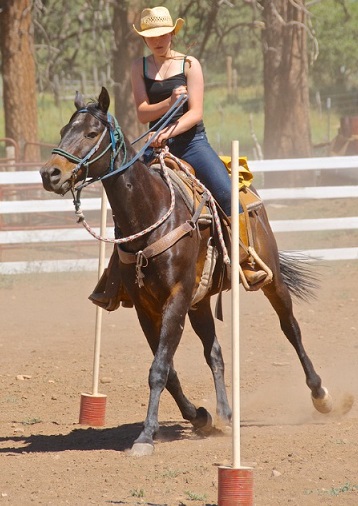 I am no equinophobe, but I find horseback riding unnerving. I have ridden enough to know some basic rules, but not enough that being in a saddle doesn’t put me on guard. Our recent western “en famille” trail rides provide personal insights from a fake it-til-you make it equestrian and public speaking coach.
I am no equinophobe, but I find horseback riding unnerving. I have ridden enough to know some basic rules, but not enough that being in a saddle doesn’t put me on guard. Our recent western “en famille” trail rides provide personal insights from a fake it-til-you make it equestrian and public speaking coach.
I rode behind the lead wrangler because I knew that I would feel safer. I asked lots of questions, mostly about the things that were making me nervous and uncertain. Our conversation sounded something like this:
Me: “So should I do something when my horse gets his nose in the backside of your horse?”
Clint : ” Nope, let the horses work it out between them.”
Me: “Why is my horse snorting so much, is something wrong?”
Clint:” The trail is dusty, he is clearing his nose.”
Me: ” Indy, (my horse) keeps munching on grass and oak bush leaves, is he hungry?”
Clint: “No he is not. Don’t let him get away with that. Hold the reins higher…let him know who is in charge.”
Me: “Indy has stumbled a few times, could something be wrong with one of his shoes?”
Clint: “Nope, it’s just rocky terrain.”
Clint’s horse suddenly sidesteps and kicks up a bit. I yelp. Some sort of electric horse current passes through the first six horses on the trail. Clint turns his horse in a few sharp circles, stops, dismounts, hands me his horse’s lead rein (now I am in charge of two horses?) and walks over to pick up a plastic bag that has blown across the trail.
Me: “What is going on?”
Clint: ” Horses are scared of sudden movement. This plastic bag spooked my horse and all the others reacted.”
By the end of our week and after a few rides I get on an even keel with Indy and the rhythms of riding. Horses, like people, have distinct personalities. And because they are prey animals, their defense mechanisms are highly attuned to unexpected sights and sounds. Knowing this and my role as the rider, helped me to do my part to make the ride more enjoyable for Indy me for me.
How did this experience inform my public speaking philosophy?
1. Rely on experienced handlers. If you aren’t speaking to crowds of people regularly with a high sense of comfort, then turn to experienced guides to lead the way. This creates a path for your personal safety, effectiveness and increased enjoyment for you and your audience.
2. Don’t assume the worst. Because it was new to me, I interpreted each horse behavior on the trail as potentially life threatening. Sometimes horses stumble, need to clear their noses and have irrational fears, just like we do. It was altogether explainable and knowing the facts minimized my over-active and over-reactive mind.
3. Take charge, but relinquish control. A horse can physically overpower a rider every time. But, a horse, like an audience, will go astray if you don’t handle the reins and assert your leadership. Mastery means managing and leading the process, but if you think you are in control, well, then something as simple as a passing plastic bag could really undermine your presentation. This distinction is the difference between presenters who serve their audience and those who act as if they are doing the audience a favor. And the latter really get on my nerves!
4. Enjoy the ride. While I focused on my initial fears in this post, the truth is that I enjoyed the experience of relating to a horse and learning the unspoken and spoken language of movement between us. I love the smell of horses, how they look, the texture of their manes and the earthy aroma of their manure. Similarly, there is a thrill to speaking clearly and confidently to a group of people, knowing that your ideas resonate and resound.
5. There is no substitute for experience. My last trail ride was infinitely more relaxed and confident than my first. As always, I understand this truth in hindsight in most all my experiences and activities. So I remind you, too with great humility.”Wild horses, couldn’t drag me away.” The Rolling Stones
Happy trails and Happy free 4th from SpeakWell Partners.
-Charlotte


